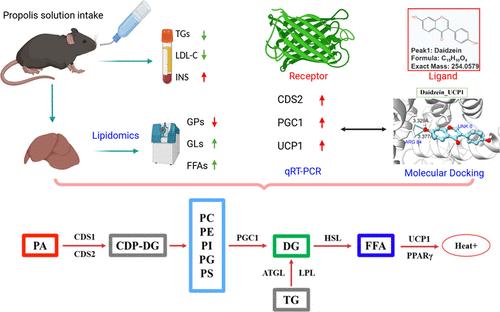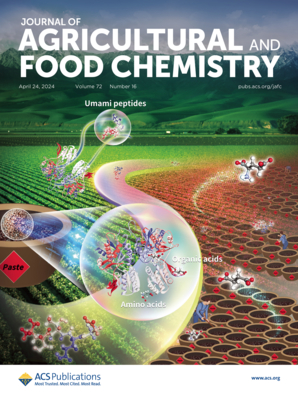长期蜂胶摄入诱导的小鼠肝脂重塑:对磷脂-甘油酯代谢和游离脂肪酸介导的产热的影响
IF 6.2
1区 农林科学
Q1 AGRICULTURE, MULTIDISCIPLINARY
引用次数: 0
摘要
有关蜂胶调节肝脏脂质重塑的模式和机制的研究十分有限。在本研究中,为期九个月的实验揭示了蜂胶对小鼠肝脏脂质代谢和产热能力的积极影响。采用UPLC-QTOF-MS技术对蜂胶中的八种主要化合物进行了表征。蜂胶能明显降低血清甘油三酯(TGs)和低密度脂蛋白胆固醇(LDL-C),但也会导致胰岛素(INS)水平升高。对42类1671种脂质成分进行的脂质组学变化趋势分析表明,肝脏中甘油磷脂(GPs)水平下降,而甘油三酯(GLs)和脂肪酸(FAs)水平上升。蜂胶组中参与肝脏中GP向GL转化途径的八个关键基因的表达水平有所提高。分子对接结果表明,蜂胶的八种成分与八种参与脂质代谢的受体之间具有很高的结合亲和力,这表明蜂胶的主要化合物具有强效的磷脂重塑和脂肪分解能力。这些结果表明,蜂胶可促进肝脏脂肪组织的棕色化,促进GPs向DGs和FFAs的转化,通过产热途径增加FFAs的消耗,从而发挥解脂和保肝功能。本文章由计算机程序翻译,如有差异,请以英文原文为准。

Long-Term Propolis Intake-Induced Liver Lipid Remodeling in Mice: Effects on Phospholipid-to-Glycerolipid Metabolism and Free Fatty Acid-Mediated Thermogenesis
Research on the patterns and mechanisms of liver lipid remodeling regulated by propolis is limited. In the present study, the nine-month experimental duration has shed light on the positive influences of propolis on lipid metabolism and thermogenesis capacity in the livers of mice. Eight major compounds in propolis were characterized using UPLC-QTOF-MS technology. Propolis significantly lowered serum triglycerides (TGs) and low-density lipoprotein cholesterol (LDL-C), but it also led to increased insulin (INS) levels. Lipidomics change trend analysis of 1671 lipid components across 42 categories revealed that the level of glycerophospholipids (GPs) decreased while glycerolipids (GLs) and fatty acids (FAs) increased in the liver. The expression levels of eight key genes involved in the conversion of GP to GL pathways in the liver were enhanced in the propolis group. Molecular docking results elucidated the high binding affinities between the eight components of propolis and eight receptors involved in lipid metabolism, indicating that primary compounds of propolis possess potent capabilities for phospholipid remodeling and lipolysis. These results imply that propolis could facilitate the browning of the liver adipose tissue, promote the conversion of GPs to DGs and FFAs, enhance the consumption of FFAs through thermogenic pathways, and thereby exert lipolytic and hepatoprotective functions.
求助全文
通过发布文献求助,成功后即可免费获取论文全文。
去求助
来源期刊
CiteScore
9.90
自引率
8.20%
发文量
1375
审稿时长
2.3 months
期刊介绍:
The Journal of Agricultural and Food Chemistry publishes high-quality, cutting edge original research representing complete studies and research advances dealing with the chemistry and biochemistry of agriculture and food. The Journal also encourages papers with chemistry and/or biochemistry as a major component combined with biological/sensory/nutritional/toxicological evaluation related to agriculture and/or food.

 求助内容:
求助内容: 应助结果提醒方式:
应助结果提醒方式:


